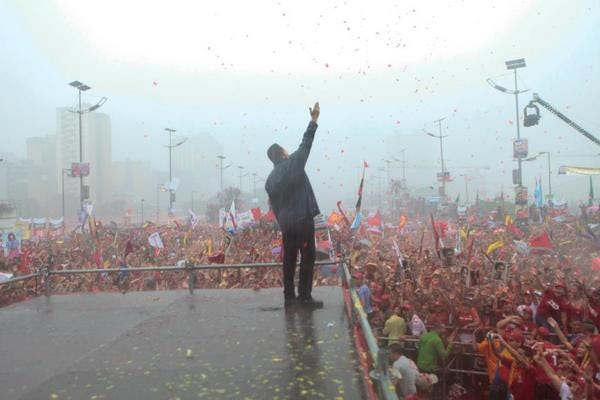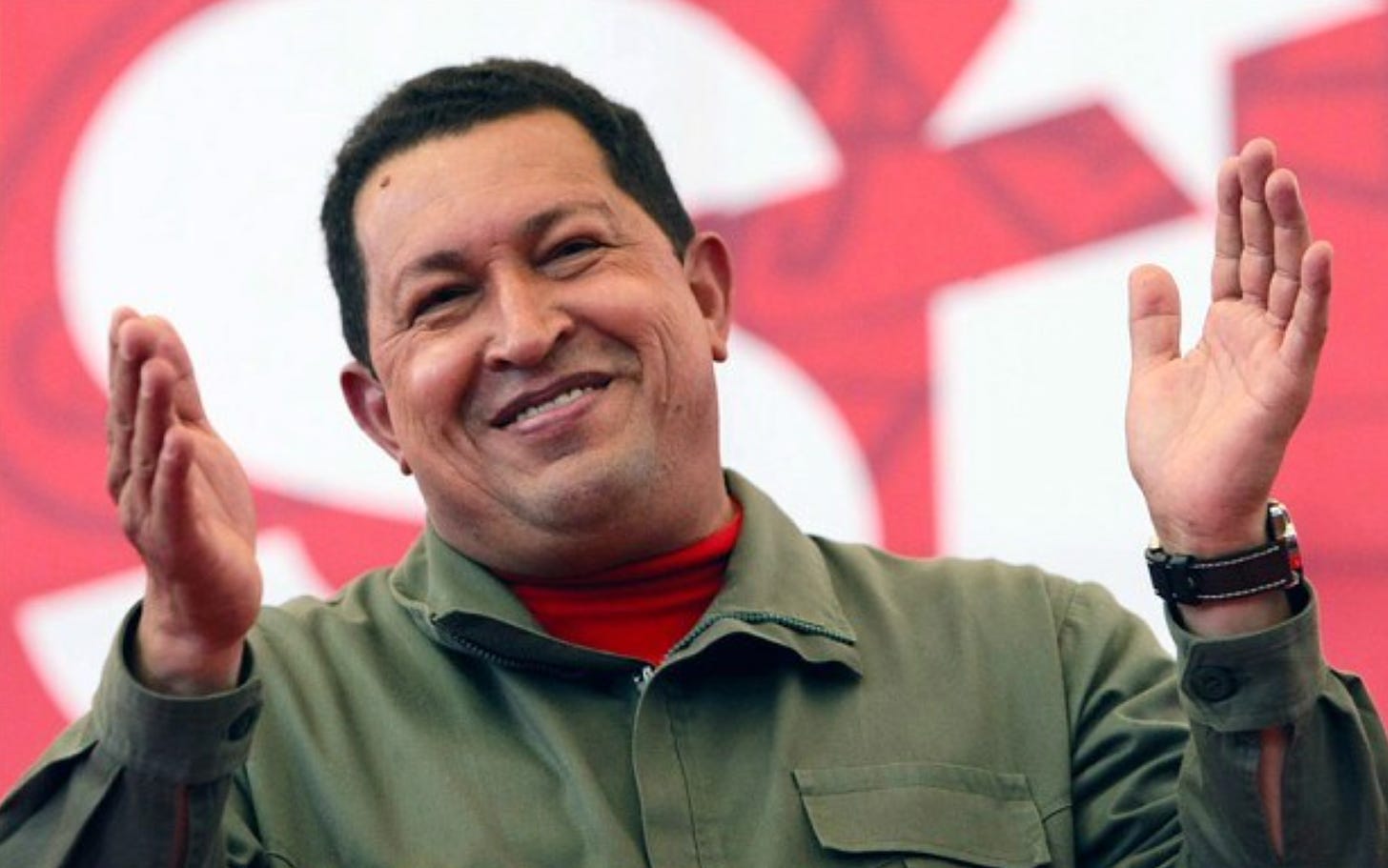11 Years Today Hugo Chávez Left Us
I wrote this article 11 years ago today when I heard that then Venezuelan president Hugo Chávez's death was imminent. Chávez's leadership and moral clarity are sorely missed.
The article ‘A Giant Has Left Us’ was originally published by Alborada and Red Pepper on 6 March 2013.
Photo: Late Venezuelan president Hugo Chávez at a presidential election campaign rally in December 2012.
A giant has left us and an intense sadness engulfs Venezuela. A few hours ago it was announced that at the age of 58 Hugo Chávez, president of Venezuela, lost his near two year battle with cancer and passed away. He joins a celebrated list of Latin American revolutionaries to have gone before their time. However, unlike Ernesto ‘Che’ Guevara or Salvador Allende to take just two examples, this time it does not appear that the US government was a culprit in the death of a leader who embodied the region’s mass yearning for social justice and independence from US dominance.
While Chávez’s political opponents were never able to remove him from the presidency, it would appear that in the end it was nature that defeated a man whose anti-imperialism and principled siding with the poor and marginalised in his country and elsewhere, inspired precisely this constituency to defend his government with such passion. “Queremos ver a Chávez!” (We want to see Chávez!) shouted the millions of pro-Chávez supporters that took to the streets in Venezuela in 2002 to demand he be reinstated as president after a US sponsored coup briefly ousted him. This people power played an instrumental role in his return to the presidency less than 48 hours after he had been kidnapped and taken to an island off Venezuela’s mainland. Theirs was truly a love affair with “their” president, whose support base was to be found in the low-income neighbourhoods known as barrios that encircle Caracas and other Venezuelan cities. It was these people who had, more than any other group, experienced a dramatic improvement in their material conditions They experienced at first-hand what can happen when a government is prepared to stand up for the poor and marginalised.
In contrast to his popularity at home, Western elites viewed Chávez with a cynical disdain. These sentiments spread to large sectors of the general population, through a an anti-Chávez mass media campaign that systematically distorted events in Venezuela. Rather than try to explain Chávez’s appeal to large sectors of the Venezuelan population or understand the process of radical change underway in the country, the West’s media class preferred to focus almost entirely on the figure of Chávez. It was precisely this narrative that was so effective in discrediting the Venezuelan process through concealing the role of collective agency, silencing the people from below, rendering them insignificant.
Nevertheless, Chávez still held a wide appeal beyond Venezuela’s borders, especially in the countries of the global South, who understood all too well what imperialism meant in practice. In Chávez, many saw a genuine leftwing icon, someone with the courage to lead the fight against US imperialism, not only in Latin America but across the world. However, there were those on the left, especially in the West, that displayed an increasing antipathy to Chávez, perhaps the result of the distorted picture of Venezuela generated by the media. Others remained suspicious that a man coming from the military could offer a progressive politics, especially in a continent where the military’s record is steeped in blood. A deeper understanding of the specificities of the Venezuelan case is a prerequisite for purging prejudice.
My own decision to spend a year and half in Venezuela between 2005-2007 was the result of my desire to see for myself what kind of process was unfolding under the Chávez government. What exactly was going on that so provoked the ire of the US government and the Western political and media classes?
I found a country in the midst of intense and profound changes, with a new constitution heralded for its progressive content such as the rights it accorded to traditionally ignored groups such as Venezuela’s indigenous peoples. There were government supported community radio and television stations being run by young people; neighbourhood assemblies that discussed how to “transfer power to the people”; government-subsidised supermarkets in the poorest neighbourhoods (where articles of the constitution were explained in cartoon form on the packaging); a plethora of free cultural festivals and debates about socialism on the streets of Caracas and across the country. All this felt like being transported to another planet, one where social justice and human dignity were a priority. In the midst of all of this was the commanding figure of Chávez, whose leadership qualities and charisma were so evident that no credible domestic opponent could deny them. Such opponents included the (generally white skinned) elite that had traditionally ruled Venezuela, whose fury at their loss of political power was only exacerbated by the gradual erosion of their economic domination of the country. Again the private media was harnessed to fuel the fires of hatred towards Chávez and his government.
Of course Chávez’s charisma was a double-edged sword. It served both to placate divisions between various factions of his movement and energise his followers into action (especially at election time); but it also fed into what was arguably one of the major weaknesses of the Venezuelan process: the over-reliance on Chávez. This, in turn, disincentivised the search for a new or collective leadership. Nevertheless, with Chávez around, the movement for radical change in Venezuela felt, for the most part, irrepressible.
Despite this and other weaknesses, I returned from Venezuela convinced that the country’s ‘Bolivarian’ process was a noble experiment; that at its core it was seeking to create a society where human needs are prioritised over corporate needs. In most of the world this is clearly not the case. For me, Venezuela’s “threat of a good example” is a subversive alternative that is not only challenging neoliberalism and capitalism but is laying the foundations for a 21st Century socialism.
I had the privilege of observing Chávez at close quarters when, as part of the team filming with John Pilger for his documentary ‘The War on Democracy’, we were invited to travel with Chávez for two days. After arriving in Barquisimeto on the presidential plane, we drove through the city in a presidential convoy, where thousands of Venezuelans lined the streets and waved the convoy on. This was a genuine expression of affection for someone they considered their own. At the first event, in a massive stadium, I was struck by the patient manner in which Chávez explained what his government was doing. At a further three events that day Chávez explained his government’s vision, using metaphors and a language that resonated with ordinary Venezuelans.
It was these Venezuelans, people like Joel Linares, a community activist and friend, who every day invested their time, energy and passion into building the fairer Venezuela Chávez so often spoke about. “Chávez has given the people back their spirit of struggle. Because the ideas of struggle don’t die” was what Mariela Machado, a nurse and community activist in the La Vega barrio, told me when I asked her what she felt was the biggest change she had experienced under the Chávez goverment.
So as the forces of reaction in Venezuela and abroad get ready to step up their offensive against the Venezuelan process while trying their best to conceal their delight at Chávez’s death, we should remember his true legacy.
Hugo Chávez galvanised the Venezuelan people into taking centre stage in the country’s political process. He was a leader and a teacher but above all someone that demonstrated an unwavering faith in the principle that the people are the best architects of their freedom. In doing so he inspired not only millions of Venezuelans, but millions more around the world who believe in the urgency of building an alternative.
Viva Chávez!
END
Hugo Rafael Chávez Frías (28 July 1954 – 5 March 2013)
The excellent independent English-language media outlet Venezuelanalysis has today posted the following on X (formerly Twitter):
Hugo Chávez passed away 11 years ago leaving behind an extraordinary legacy of fighting against imperialism and Zionism while building a socialist alternative. Here are excerpts from four historical speeches to fuel our struggles today
Watch the excerpts on their X thread here.
On the 6 March 2013 I was invited to various BBC programmes to discuss Hugo Chávez and his legacy. You can listen to a radio interview I did on the BBC World Service’s 'Newshour' here and watch my interview on the BBC’s TV’s ‘Newsnight’ programme here and below:
Watch my 2009 documentary Inside the Revolution: A Journey into the Heart of Venezuela, here. Read an interview with me about the film here.
Watch the late, great John Pilger’s 2007 documentary The War on Democracy (which I was the Venezuela field producer for and which also features my father Roberto Navarrete) here. You can read an interview I did with Pilger about the film here.




